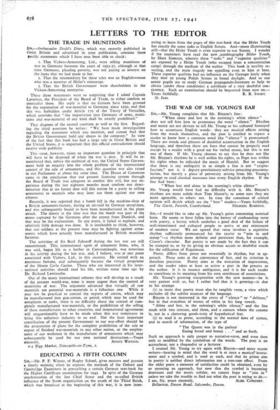THE WAR OF MR. YOUNG'S EAR
SIR,—Mr. Young complains that Mr. Binyon's line:
" When alone and lost in the morning's white silence " does not tell him how to pronounce the word " silence." Rhythm and metre are not devices to tell Mr. Young or his cultured Samoyed how to accentuate English words: they are musical effects arising from the words themselves, and the poet is entitled to expect a reader to know how a common word like "silence " is pronounced. There are words and phrases of doubtful accentuation in the English language, and therefore there are lines that cannot be properly read except by a reader with a good ear for verbal music, but this is not one of them. If Mr. Young chooses to say that he does not like Mr. Binyon's rhythms he is well within his rights, as Pope was within his rights when he ridiculed the music of Handel. But to suggest that there is any ambiguity in so simple a line is not " crypto- fascism," nor is it deputy-provisionary-subvice-proacting-proconsu- larism, but merely a piece - of perversity arising from Mr. Young's attempt to read classical measures into every English rhythm. If the line had been: " When lost and alone in the morning's white silence " Mr. Young would have had no difficulty with it. Mr. Binyon's rhythms are more subtle than Tom Moore's; to some ears they are more agreeable, to others not. In time the consensus of critical opinion will decide which are the " best " readers.—Yours faithfully, The Garth, Penrith, Cumberland. MICHAEL ROBERTS.






















 Previous page
Previous page